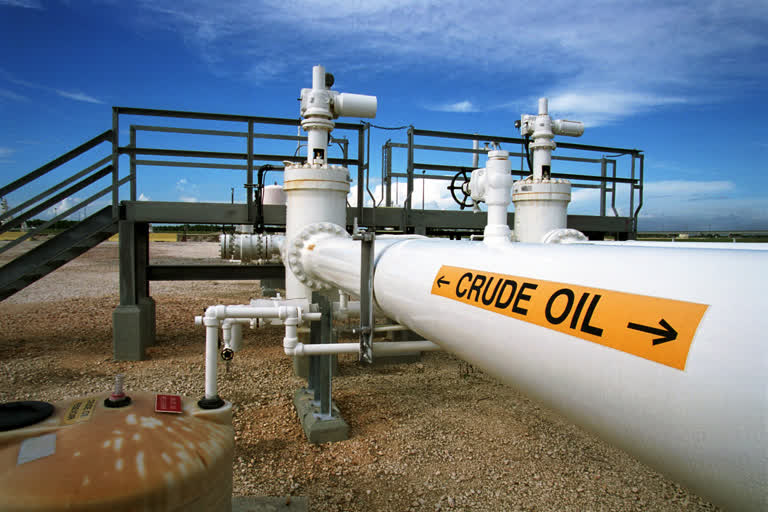Hyderabad: Global Crude oil prices appears to be bouncing back. The Brent crude touched $43.14 on Tuesday, after gaining 2.1% on Monday. On the other hand the WTI Crude has more than doubled since hitting a 21-year low in April 2020 and there are hopes that this rally would continue.
This trend is largely due to three reasons. First, the record OPEC+ supply cuts of 9.7 million barrels per day, secondly the drop in U.S. refined product inventories and third reason is the slight revival in demand. In this backdrop it is pertinent to note that despite these developments, crude oil prices are going to remain subdued in the short and medium term, which will have policy implications for India and rest of the world.
“Cheap Crude” is the new normal:
The COVID-19 infections are rising at an alarming trend across the world. South Korea announced this week that the country is the midst of a 'second wave' of the coronavirus. Most importantly, the World Health Organization (WHO) reported a record increase in global Covid-19 cases on Sunday, with the biggest increase from North and South America.
Also Read: Diesel to surpass petrol prices for 1st time in India
Even there are fears that the virus could potentially make a resurge in China, the world’s biggest crude importer. These developments could push the global economy towards a further slowdown, which means lesser economic activity and lesser demand for oil.
Eventually this would result in low crude oil prices. On the other hand the beginning of the of hurricane season is a major challenge for the crude oil prices that could dampen any hopes of better prices in the near term. Thus ‘cheap crude’ would be the new normal and the world has to deal with it.
Implications for India:
It is clear that the crude oil prices jumping to the levels of $70 per barrel again is a distant reality, given the geo-political and economic developments across the world. While India has little control over the international crude oil prices, oscillation of crude prices have far reaching policy implications for the country.
In the present context, India is at gain due to low crude prices and it is visible from the record level piling up of the forex reserves worth $507.64 billion as on date. This is largely due to a lesser import bill that is usually dominated by crude oil imports, whose average was nearly 4.5 million barrels per day in 2019.Given this large stakes, there is a need to look at the short term, long term and the medium term policy choices to take advantage of the situation.
In the short term there is a need to translate the benefits of lesser crude prices to the general public. This would initially bring down the transportation costs and even the production costs and eventually makes goods cheaper.
On the other hand it would improve purchasing power of the customers, and induces domestic demand, which is the need of the hour to revive the economy.However, on the contrary, price of petrol has been increased by a cumulative Rs 8.88 per litre in the national capital, and diesel by Rs 7.97 per litre in the last fifteen days.
Also Read: COVID-19 LIVE: 2,15,195 COVID-19 tests conducted in last 24 hours, says ICMR
The present policy of offsetting the gains on cheap crude prices by hiking the fuel prices may bring in tax revenue but it would potentially dampen the economic recovery. Both the State and Union governments need to take this aspect into consideration before raising the fuel prices.
In the medium term, it is pertinent to improve our capacity to store the crude oil, in case of its cheap availability. At present India has a storage capacity of 39 million barrels, can provide fuel security for nine days for the country. However it is too little when compared to its Asian counterparts like China and Japan, with the Strategic Oil Reserves (SOR) storage capacity of 550 million barrels and 528 million barrels respectively.
In this context there is a need to scale up public investments in enhancing our capacity of the SORs.It would not only help us store cheap oil but also provides employment opportunities to working class and boost demand for construction materials, which is very much needed in these tough times. In the long run, India need to strategically make a gradual shift towards renewable sources of energy on one hand and strive for energy efficiency on the other hand.
This is due to the fact that crude oil prices are highly volatile and are subject to change due to factors that are beyond India’s control. Long term dependence on such resource for the country’s energy security will have economic and strategic costs for the country. The sooner we take these steps, the better it would be. All we need is a strong political will.
(Written by Dr. Mahendra Babu Kuruva. The Author is an Assistant Professor, H.N.B. Garhwal Central University, Uttarakhand. Views expressed above are his own.)



